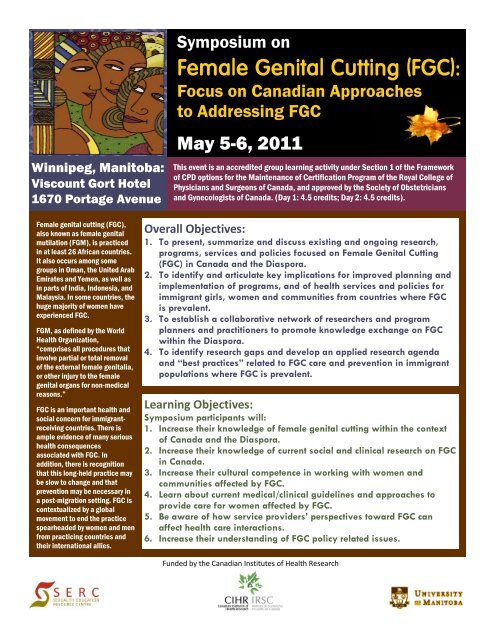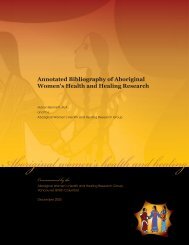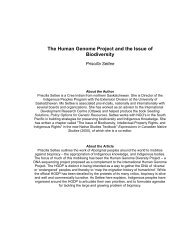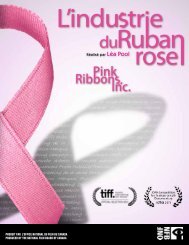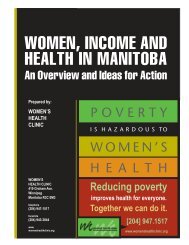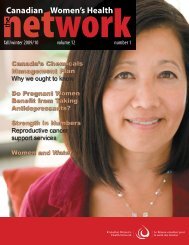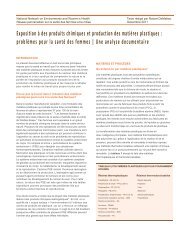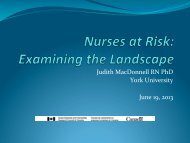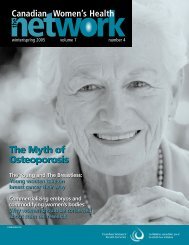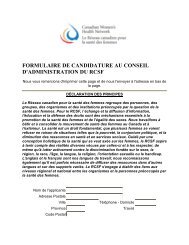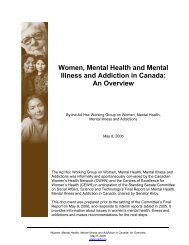FGC Symposium Program.pdf - Canadian Women's Health Network
FGC Symposium Program.pdf - Canadian Women's Health Network
FGC Symposium Program.pdf - Canadian Women's Health Network
Create successful ePaper yourself
Turn your PDF publications into a flip-book with our unique Google optimized e-Paper software.
Lisa Avery, MD, FRCSC, MIH - After completing her residencyin obstetrics and gynecology at University of Manitoba, Dr. Averyrelocated to Denmark where she obtained her Masters degree inInternational Public <strong>Health</strong> from the University of Copenhagen.During her time in Denmark, Dr. Avery also worked for the WHORegional Office for Europe, where she was able to further pursue herinterest in the area of sexual and reproductive health of women in lowand middle income societies, with a focus on marginalizedpopulations.Upon returning to Canada, Dr. Avery accepted a faculty position at theUniversity of Manitoba’s newly created Centre for Global Public<strong>Health</strong>, with cross appointments in the Departments of MedicalMicrobiology and Obstetrics, Gynecology and Reproductive Sciences(where she is also director of resident research). Currently she dividesher time between reproductive public health programmes and researchin India, Kenya and Canada. While the amount of travel overseasprevents her from having a clinical practice of her own, clinical locumopportunities in Yellowknife, Northwest Territories and Winnipeg,Manitoba allow Dr. Avery to continue to be active in providingclinical care, which she very much enjoys. While in Kenya she is alsoactively involved with the fistula repair program.She is a member of SOCG and since 2007 has been the editor of“Entre Nous” the WHO Regional Office for Europe’s Journal onSexual and Reproductive <strong>Health</strong>.Ms. Najla Barnawi (MN, PhDStudent) is an International PhD Student onScholarship from the Saudi Arabian governmentfor 5 Years. She is doing her PhD degree atUniversity of Alberta, Faculty of Nursing. Shedid her Masters degree at University of Toronto,in <strong>Women's</strong> <strong>Health</strong> Studies in the NursingFaculty. Ms Barnawi’s doctoral investigationfocusing on female genital cutting and the impactof this on labor and delivery, is novel andprofoundly important for immigrant women whohave undergone this procedure as theconsequences may be overwhelming both for thewomen and health care providers. The potentialcomplications that may ensue during labor anddelivery maybe serious, life-changing andpreventable. The topic is vastly under-researchedin the <strong>Canadian</strong> context, yet Canada is one of thetop immigrant receiving nations globally withimmigrant populations from national stateswhere female genital cutting is commonplacesuch as Saharan and Sub-Saharan Africa.Clinical Encounters: CrossCultural Perspectives inSexual and Reproductive<strong>Health</strong>Through the use of clinical casevignettes health care provider’sknowledge, understanding andperceptions of Female Genital Cutting(<strong>FGC</strong>) will be presented, includingemphasis on the potential positive andnegative effects these beliefs may haveon sexual and reproductive healthseeking behaviour and outcomes ofdifferent cultural groups. By the end ofthe session the participant will: befamiliar with the WHO definition for<strong>FGC</strong>; learn about the prevalence of<strong>FGC</strong> in the <strong>Canadian</strong> context; be awareof adverse health outcomes associatedwith <strong>FGC</strong>; recognize the importance ofcultural sensitivity in clinicalencounters with clients of differentcultural backgrounds; and be aware ofhow health care provider’s perspectivestowards <strong>FGC</strong> can affect health careinteractions.Circumcised Immigrant Pregnant Women:Implications for the <strong>Canadian</strong> <strong>Health</strong> CareSystemFemale Circumcision (FC) is defined by the World <strong>Health</strong>Organization (WHO) as "all procedures involving partial ortotal removal of the female external genitalia or other injuryto female organs whether for cultural or other nontherapeuticreasons" (WHO, 1995). Numerous women whohave undergone FC immigrated to Canada. However,<strong>Canadian</strong> health care professionals lack knowledge, as wellas cultural sensitivity, about circumcised immigrant womenin general and pregnant women (CIPW) in particular.This presentation will focus on the following themes: thecultural context for FC highlighting the gap that existsbetween the CIPW and health professionals; critiques of<strong>Canadian</strong> movements regarding FC legislation whichemphasize primary prevention versus secondary prevention;strategies for the development of clinical guidelines forCIPW which include a) increasing evidence based onqualitative research and b) building cultural competency inproviding care to CIPW.
BIOS AND ABSTRACTS cont’d.Simret Daniel, BN - is an internationally educatedPublic <strong>Health</strong> Nurse currently in the process of registrationas an RN in Canada. Simret has worked with the SexualityEducation Resource Centre (Winnipeg) as the “Our SelvesOur Daughters” Project Facilitator since 2009. In this role,Simret has co-facilitated the community engagementconsultations, education sessions and service providers’workshops. She has also worked in community developmentat Mount Carmel Clinic. Prior to coming to Canada, she hadmore than five years of nursing experience, providing patientcare and delivering health education about the possiblehealth risks of <strong>FGC</strong> to women in different communities(mainly refugees) in two African countries.Linda Plenert, BA, is a Sexual and Reproductive<strong>Health</strong> Facilitator with the Sexuality Education ResourceCentre in Winnipeg. Linda is an experienced facilitatorworking in a variety of communities in the areas of cultureand sexuality, women's sexuality, aging and sexuality, andfamily communication about sexuality. Linda has beeninvolved with many aspects of the Our Selves, OurDaughters project from its early stages. She and SimretDaniel collaborated on the development and facilitation ofthe community education sessions as well as the serviceprovider training workshops.Our Selves, Our Daughters:Community-Based Education andEngagement with AfricanNewcomer Women in WinnipegEquipped with the information provided by thecommunity-based research process, a 10-weekseries of community education workshops wasdeveloped. Three series of workshops were heldwith women from an African community.The workshops were designed to provide aculturally safe space for women to learn andshare. Sessions addressed women’s overallsexual and reproductive health; the topic of<strong>FGC</strong> was integrated throughout. Livelydiscussions explored the complexities of thecultural factors that support the practice as wellas the implications of change.Evaluation of the sessions, as well as directfeedback from the community at our FinalEvent, showed strong support for this integratedmodel of community engagement, consultation,and education to address this culturally complexand taboo subject.Shereen Denetto, MSW, has worked at theSexuality Education Resource Centre as Special ProjectsCoordinator since 2004. In this role, she has coordinatedseveral projects in and with immigrant and refugeecommunities addressing, through education andcommunity engagement, women’s and men’s sexual andreproductive health, family communication/conflict, andviolence prevention. She has worked in numerouscommunity health settings in Ontario and Manitoba. Herwork is strongly informed by a social justice and humanrights perspective.Paula Migliardi, MA Paula received a Mastersdegree in Anthropology from the University ofManitoba. Much of her work and interest lie in socialand health areas, designing and developing of researchand evaluation with a diverse number of organizationsand communities. She is the Research and <strong>Program</strong>Evaluation Coordinator with the Sexuality EducationResource Centre (SERC), and works as the CommunityBased Research Facilitator of the Prairie HIVCommunity-Based Research <strong>Program</strong> for Manitoba andSaskatchewan.Our Selves Our Daughters: A Community-Based Research Project with an AfricanNewcomer Community in Winnipeg Addressing Female Genital CuttingThe “Our Selves, Our Daughters” project was initiated bya nurse from an African newcomer community whoapproached SERC wanting to address the health impactsof <strong>FGC</strong> and support prevention. We began the project with8 months of community-based consultation and researchwith the aim to develop relationships and trust, gatherknowledge, build support, and sensitize the community tothe concept of addressing <strong>FGC</strong>. We conducted 5consultation groups with a total of 30 women, 3 follow-upinterviews and individual interviews with 8 communityleaders (3 women, 5 men). A participatory approach wasused to analyze findings. We held community meetingswith grassroots women and leaders to further verify,validate and expand on the learnings of the consultations.Women’s exploration of sexuality and sexual health
Community Based Service Provision Cont’d.BIOS AND ABSTRACTS cont’d.Women’s <strong>Health</strong> in Women’s Hands Community <strong>Health</strong>Centre has developed a collaborative process to addressa pressing need within the community to improve accessto primary health care for women affected by FGM. Thegoal of this model is to remove barriers and increaseaccess to primary health care services by developing aninclusive and collaborative model for health care servicedelivery. The presentation will highlight ourparticipatory research findings which identifythe experiences that women have when attempting toaddress health care issues and facilitators and barriers tothis population receiving adequate health care services.Kowser Omer‐Hashi –Somali midwife and BBA, University ofOhio. Kowser has been a strong advocateand counsellor for Diaspora women withFGM. As a sexual health educator at theBirth Control & VD Info Centre inToronto, Kowser heard many women’s,especially Somali women’s, stories aboutthe intimidation and discomfort theyexperienced because of FGM whendealing with the <strong>Canadian</strong> health system.Kowser initiated the first programs onFGM for Somali women in Canada,providing educational sessions for healthcare professionals, teachers and communityservice workers. Kowser’s work asan advocate, researcher, writer, educator,participant in public forums, and lobbyistat both provincial and federal levels, hasbeen instrumental in creating improvedaccess to information and culturallyappropriate health services for immigrantand refugee women with FGM. Sheeducated the media and lends her face andvoice by participating in print media,radio talk shows and in televisiondocumentaries. She was a short termconsultant with WHO on FGM. She hasalso contributed to the education of thegeneral public and western feminists inNorth America and abroad. Kowser is amember of various community boards andhospital advisory committees, Co-Chairof the <strong>Health</strong> Committee of the OntarioFGM Prevention Task Force, andprovides expert witness consultations onimmigration cases for refugee womenwith FGM in Canada and the USA.Kowser is the winner of the ACCESS,Equity and Human Rights Constance E.Hamilton Award, City of Toronto 2001.FGM: Global perspectives, <strong>Canadian</strong> ContextFemale Genital Mutilation (FGM) is a traditional practice of unknownorigins that was established centuries ago. In the contemporarycontext, 600 girls are subject to the practice daily, 3 million girls ayear experience FGM, and an estimated 140 million women and girlshave already undergone the procedure. International efforts toeliminate FGM have a long history. In Africa, colonialadministrations and Christian missionaries attempted to stop FGM asearly as the 17 th century. FGM was raised as a human rights issue atthe United Nations for the first time in 1952, but it took two moredecades before the UN began to officially discuss the issue in the1970's. Few African women have had the opportunity to collectivelynetwork and discourse about how to use a culturally sensitiveapproach to abandon the practice.Global migration in the late 1980s of women with infibulation,brought the practice to Canada, the United States, and Europe. Theirpresence gave rise to a movement to eradicate FGM and contributedto the development of international human rights and other laws thatoppose the practice. For the first time individuals lobbied the<strong>Canadian</strong> federal government to take a stand against FGM;WHO raised ethical concerns and advocated against medicalization ofthe procedure. This presentation will provide an overview of thesemovements that support the eventual eradication of FGM.Female Genital Mutilation and Obstetric Care“Female Genital Mutilation and Obstetric Care,” was the first<strong>Canadian</strong> book on FGM and childbirth, and has been translated intomany European languages. Co-written with Dr. Beverley Chalmers(University of Ottawa), it emerged out of our efforts to prevent,eradicate, and provide support and better health care to women withFGM as well as to educate both women and their caregivers aboutthe practice and its care. The book discusses social, cultural, medical,emotional, and ethical issues regarding FGM. It provides definitionsof and describes various types of FGM, explores common culturaljustifications for the practice, documents the incidence of the practicein Africa, the methods by which it is done, and its impact onpregnancy, birth and sexuality. Personal interviews with women willbe presented to help expand and enrich the discussion. Thoughts onthe cultural evolution of the practice will also be presented. Finally,legal issues, rights, global laws and religion will be examined inrelation to the progress made in eliminating FGM.
Naana Otoo‐Oyorteyis the Executive Director of theFoundation for Women’s <strong>Health</strong>Research and Development(FORWARD). FORWARD is thelead agency in the UK working totackle female genital mutilation(FGM). For the last 25 yearsNaana has worked in the field ofsexual and reproductive healthand rights and women’s issues asan advocate, trainer andconsultant. Naana has a particularinterest in tackling gender baseddiscriminatory practicesincluding FGM, child marriageand sexual violence which impactadversely on sexual andreproductive wellbeing anddignity of African women andgirls. Naana holds an MPhil inDevelopment Studies from theInstitute of Development Studies,Sussex University.BIOS AND ABSTRACTS cont’d.FGM: Community Based Work in the UKThis presentation will share FORWARD’s community developmentapproach to addressing female genital mutilation (FGM) in the UK. Thewomen’s health and leadership skills training is designed to increaseessential skills of women from FGM practicing communities and targetswomen from East Africa and West Africa. The approach aims to enablewomen to work towards ending FGM and to empower women and youngpeople to access needed services. The modules focus on confidencebuilding; communication and facilitation skills; FGM law and safeguardingchildren and FGM and sexual and reproductive health. The presentation willalso discuss the PEER study results and Young People Speak Out<strong>Program</strong>me and screen the 8 minute DVD- “Think Again” developed byyoung women for raising awareness.FGM: Policy Development in the UKThis presentation will review UK Policy on FGM in recent years andhighlight the need to strike a balance between prosecution, provision andprevention. It will examine UK’s legal and safeguarding policy and the newmulti-agency guidelines for professionals. It will outline barriers to effectiveimplementation of existing policies and absence of prosecution in the UK.The presentation will close with a review of the END FGM EuropeanCampaign strategy recommendations for effective action on tackling FGMwithin Europe based on five key dimensions; data collection, health,violence against women and girls, asylum and development cooperation.Liette Perron is a graduate of theUniversity of Ottawa and has worked in Canadafor many years in community basedorganizations offering services for womenvictims of gender violence. Internally, she alsoworked as a <strong>Canadian</strong> volunteer in the socialdevelopment field in Egypt and Tunisia. In1998, she joined the International Women’s<strong>Health</strong> <strong>Program</strong> at the Society of Obstetriciansand Gynaecologists of Canada (SOGC) whereshe contributed to the development andmanagement of the Society’s internationalactivities in developing countries. Through herwork, she has been involved in organizationalcapacity building initiatives involvingprofessional associations in numerous countriesin Africa, Central America, South East Asia andSothern Eastern Europe. She recently completeda Masters in Social Work at Carleton University.SOGC’s Policy Statement and GuidelineRelated to FGM/CIn 1992, the Society of Obstetricians and Gynaecologists ofCanada (SOGC) adopted a policy statement condemningthe practice of female genital mutilation. The statementclearly declared the practice never medically indicated andfurther, recommended that physicians performing theprocedure be reported to their provincial licensing bodies.The document further encouraged <strong>Canadian</strong> physiciansproviding services to women who have been subjected tothe procedures to treat them with understanding andcompassion. In 2010/2011, the SOGC undertook a processto review its position statement and further develop anaccompanying clinical guideline which would strengthenthe framework for care of women with FGM in Canada.The presentation will focus on presenting the outcome ofthe review process and further, sharing a summary of theclinical guideline developed to improve access and qualityof services to women with FGM/C in Canada.For more information, contact:Paula Migliardi: paulam@serc.mb.ca OR Shereen Denetto: shereend@serc.mb.ca


